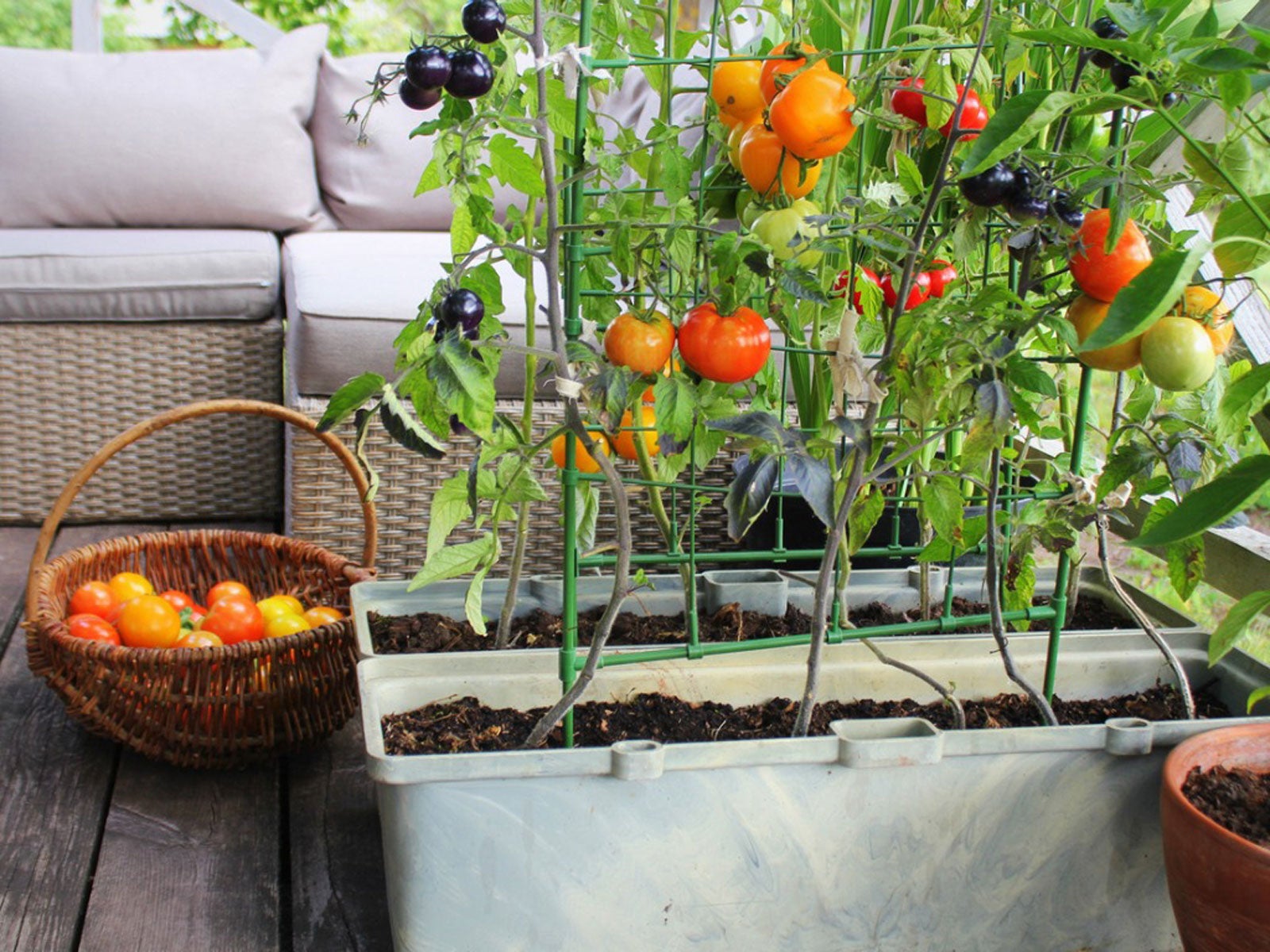Raising Vegetables On Decks: How To Grow Vegetables On Your Deck

Growing a vegetable garden on your deck is exactly the same as growing one in a plot; the same problems, joys, successes, and defeats can be had. If you live in a condo or apartment, or sun exposure around your house is limited, a container or raised vegetable garden on your deck is the answer. In fact, a portion of a roof, window box, or outdoor stairway or stoop are all excellent options for vegetable garden containers, provided they will receive at least six hours of full sun a day.
Benefits to Growing Vegetable Gardens on a Deck
Even if you do have yard space for a garden, vegetable garden containers can help overcome some common gardening problems like fusarium or verticillium wilt, nematodes, poorly draining soil, or pests like gophers. Additionally, the soil in a container warms more quickly in the spring, allowing you to plant tomatoes or peppers way ahead of schedule. Also, those crops which require more sun or are receiving too much sun and perhaps getting sunburned, can more easily be moved to a more exposed or protected area dependent upon the need. Folks with limited mobility will find that a container or raised vegetable garden will enable them to tend crops without squatting or kneeling. Also, veggies grown in containers can add great visual interest and beauty to the deck or stoop.
Deck Vegetable Garden Ideas
Almost any vegetable that can be grown in an outdoor garden plot may be grown in a container. There is no need to grow dwarf varieties, although these are fun too! Obviously, depending upon your climate, some veggies grow better than others; for instance, peppers and tomatoes do fabulously well in the south due to a long growing season, while snow peas and beans do well for us in the Pacific Northwest. If you are seriously limited on space, there are a few “space saving” vegetables to try as a vegetable garden container:
With the right staking or caging, many veggies, like the beans or snow peas, can easily be grown in a container, and even corn will do well in a pot. Some veggie plants do well in a hanging basket or can be grown in a frame tacked to the wall of the house. Companion planting is another great deck vegetable garden idea. Combining growing herbs with vegetables will not only be useful but, in many cases, will act as pest deterrents as well as surrounding the larger veggie containers or raised vegetable garden on deck with smaller punches of color in the form of flowering annuals.
How to Grow a Vegetable Garden on Your Deck
Use a well-draining (important!) potting mix combined with a fertilizer containing a dry organic or a controlled release product. It is helpful to add water-retaining polymers to the soil mix. Make sure that your containers have drainage holes and raise the pots off the ground using decorative feet or pieces of wood. Choose large pots and deep window boxes to ensure proper space for roots and cut down on watering. Although terra cotta pots are festive, use plastic or composition materials to aid in water retention, especially if hand watering. Drip irrigation on an automatic timer is a beautiful thing. Per container, install a circle on inline emitters or 3 to 4 ½ gallon-per-hour emitters over the soil and set the controller to water often enough to keep the soil moist. Apply a fish emulsion fertilizer every two to three weeks or reapply dry organic fertilizer according to the instructions and keep an eye out for pests. Use an insecticidal soap or horticultural oil to combat insects. Make sure not to allow the pots to dry out and provide a trellis or other support for climbing veggies. Sit back, watch, and wait to reap the bounties of a container or other raised bed vegetable garden on your deck.
Gardening tips, videos, info and more delivered right to your inbox!
Sign up for the Gardening Know How newsletter today and receive a free copy of our e-book "How to Grow Delicious Tomatoes".

Amy Grant has been gardening for 30 years and writing for 15. A professional chef and caterer, Amy's area of expertise is culinary gardening.
-
 Looking For Plants To Give You The Soft And Fuzzies? Try These 5 Fuzzy Leaf Plant Options
Looking For Plants To Give You The Soft And Fuzzies? Try These 5 Fuzzy Leaf Plant OptionsLovers of texture, drama, silver foliage and tactile plants will adore these special sensory garden additions. These fuzzy leaf plant options will leave you all aglow
By Susan Albert
-
 Get Ready For A Summer Of Hummers! Grow These Full Sun Hummingbird Plants and Flowers
Get Ready For A Summer Of Hummers! Grow These Full Sun Hummingbird Plants and FlowersIf you’re lucky enough to enjoy a sunny backyard, make sure you are maxing out on your pollinator opportunities and grow these full sun hummingbird plants and flowers
By Tonya Barnett